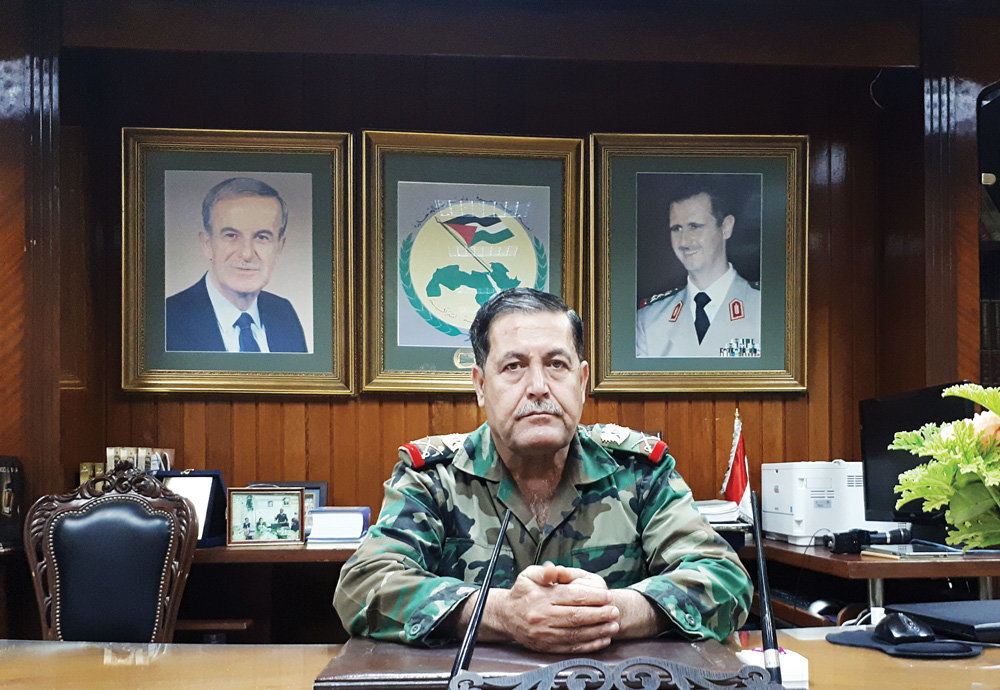Idlib is no exception and its fate will be a defeat for terrorists

The battle of Idlib is likely to be the final struggle towards the restoration of calm to Syria. How it will pan out and how the Syrian people see the struggle ahead is worth examination. Tehran Times sat with the head of the Political Department of the Syrian Army, Major General Hassan Ahmed Hassan, to discuss recent political developments in Syria and the future of Iranian-Syrian ties.
Following is the full text of the interview:
Q: What’s your assessment of the current situation in Idlib and the upcoming phase of battle?
A: Idlib is a part of an area known as de-escalation zones which have been established in a deal between Russia, Turkey and Iran. It was the alternative solution to some full-scale assault on Idlib and terrorists there.
The de-escalation zones included the city of Idlib and the surrounding countryside, the northern Homs countryside, Eastern Ghouta, and parts of Deraa. And now, these areas have been returned to Syrian sovereignty. Idlib will not be different, regardless of whether this satisfies the United States. We are facing a new reality and a transition from achievement to achievement. Over the past year, the Syrian army and the allied force have won many achievements.
I think we are not in a time of dramatic changes, but we are in the time of geopolitical shifts.
At the 15 October, 2018, deadline, we will face a new phase of battle in which those who did not lay down their arms would be confronted by Russian air strikes and the Syrian Arab Army.
I do not see in Idlib anything special to consider it the biggest battle. I think that the gathering of terrorists in Idlib, regardless of their number, means the need to confront them and protect the security of the homeland and Syria’s citizens.
On the other hand, the gathering of all these terrorists in one specific geographic location gives the Syrian army the interesting options. I should mention here that the Syrian government has set up crossings for those who want to get out of Idlib and not be used as human shield by terrorists.

It should be noted that the leaders of al- Nusra and others terrorist groups were deported. U.S. planes were landing to move terrorist commanders and leaders abroad.
In the end, Idlib will not be an exception. The decision of the Syrian government is clear, which is to continue defending the Syrian territory until it has retaken the last inch of it.
Q: How do you evaluate the role of European countries?
A: I can’t see a European role independently. Since the end of the World War II, and precisely since the Marshall Plan, the Europe has been tied to the U.S.
There seems to be a difference and contradiction between European countries but the truth is a rotation of roles: once France is spearheading and once it’s Britain. But let's ask who is responsible for groups such as ‘White Helmets’? They are created by British intelligence which known for its malice and betrayal, but the truth will not change. They know that there have been no chemical weapons used by Syria.
Q: The Leader of the Islamic Revolution spoke about the defeat of America and its agents in the region and the victory of the axis of resistance, as in Iraq, Syria and even Yemen. How do you comment on this?
A: Let’s be clear. The Islamic Republic of Iran since the days of its founder, Imam Khomeini, deals with facts and evidence. When the leader of the Islamic Revolution, Ayatollah Khamenei, says that America is losing, we will see. America entered Iraq in 2003 and did not achieve its aims and its plan was to divide the region, including Syria and Iran. The Syrian government stood by its people, its army, and support from its friends, especially Hezbollah and Iran.
The West and America have destructive power but they are not able to turn it to any win. What distinguishes Iran and the resistance is that it is capable of translating power into real achievements on the ground.
Q: In Syria today, we note Islamic cooperation between most countries, and the West rejects this. What do you think of the future of Islamic cooperation?
A: This issue is a most painful one. The Islamic nation has the potential to transform itself into a rival force in the world, and its enemies are not stupid. They have understood this for centuries. In 1904 the British Colonial Secretary Campbell Bannerman sent a team of hundreds of specialists in archeology, anthropology, sociology, economics and others to the region. They worked for three years from 1904 to 1907. The team submitted a report which unfortunately was concealed. All that the region has been experiencing is one of the plans of this team. It has not been permissible for Muslims to unite their world because they would be a great force.
Today, we are faced with Takfiri terrorism funded by the West, which is not Islam. The truth will be exposed eventually.
Q: What is the future of the Syrian people?
A: We are facing a new reality. Today, we must enhance our strengths and remove our weaknesses. No one can dictate to the Syrian people how they must think and how they live and who governs them. This is an exclusive right.
It cannot be denied that thousands of citizens are outside the country, but Damascus has always called for its citizens to return. The Syrian government does not take revenge against its own people, and the army does not aim to defeat the Syrian people.
Of course, the costs paid by Syria have been high, but whoever said that sovereignty and dignity are free?
